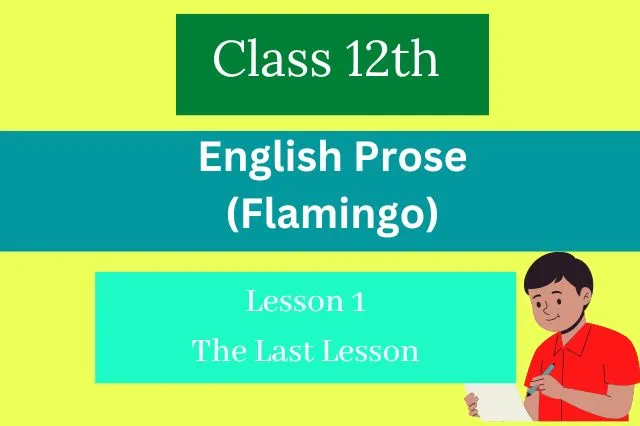Contents
Textual Question-Answers from Prose (Flamingo)
Lesson 1
The Last Lesson
Short Answer Type Questions
Q.1. What was Franz expected to be prepared with for school that day?
Ans. That day Franz was expected to be prepared with participles because M. Hamel had said that he would question them on participles.
Q.2. What had been put up on the bulletin-board?
Ans. An order had come from Berlin to teach only German in the schools of Alsace and Lorraine. The Germans had put up this notice on the bulletin-board.
Q. 3. What changes did the order from Berlin cause in school that day?
Ans. The whole school seemed so strange and solemn. On the back benches, that were always empty, the elderly village people were sitting quietly like the kids.
Q. 4. How did Franz’s feelings about M. Hamel and school change ?
Ans. Franz came to know that it was the last lesson in French that M. Hamel would give them. From the next day they will be taught only German. He felt sorry for not learning his lessons properly.
His books, which seemed a nuisance and a burden earlier were now old friends. His feelings about M. Hamel also changed. He forgot all about his ruler and how cranky he was.
Q.5. What did M. Hamel write in the last on the black board ?
Ans. He turned to the blackboard, took a piece of chalk and bearing on with all his might, he wrote as large as he could-
“Vive La France !”
II. Long Answer Type Questions
Q. 1. Franz thinks, “Will they make them sing in German, even the pigeons ?” What could this mean?
Ans.
(i) This shows a Frenchman’s typical reaction to the imposition of learning German, the language of the conquerors.
Teaching the pigeons to sing in German indicates how for the Germans would go in their attempts of linguistic chauvinism.
(ii) This sentence could possibly mean that however hard the authorities try to embed German language, the natural status of French will remain unchanged. Nature and other things cannot be governed by some superficial laws of the willful people. The reference of making the pigeons learn German, pointing to this very constraint.
Q. 2. Describe the background in which ‘The Last Lesson’ of Alphonse Daudet has been set.
Ans. The “Last Lesson” is set in the days of the Franco- Prussian war (1870-1871). France was defeated by Prussia (Germany). By an order from Berlin, German language was imposed on the French speaking people of Alsace and Lorraine . The lesson describes how in Alsace, a teacher M. Hamel, his students and the local villagers reacted to this shocking news.
Q.3. How did M. Hamel pay a tribute to the French language ?
Ans. M. Hamel declared that French was the most beautiful language of the world. It was the clearest and the most logical of all the languages, He asked the people to guard it among themselves and never forget it. As long as people ‘hold fast to their language’ they have the key to freedom. Hence, they must love and respect their own language.
